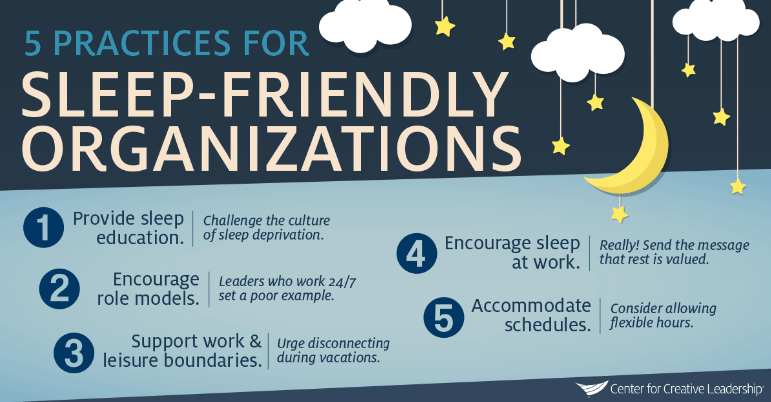Sleep Your Way to Better Leadership

Let’s talk about something we all know we need but often skimp on: sleep.
I know what you’re thinking: What does sleep have to do with leadership? Fair questions. But, sleep, no, quality sleep, has everything to do with how we show up as leaders.
This feels very different to when I first entered the business world about 15 years ago. Then the rage, fuelled by Silicon Valley’s “hustle culture” was “sleep when you’re dead”. Or if you must sleep while you’re alive, just nap. I’m only half joking.
Polyphasic sleep—dividing sleep into multiple short naps throughout the day instead of one extended period gained traction for a while in certain pockets of the entrepreneurial world in particular as a better way to maximise your productivity.
Fortunately, we’ve started to see a big culture change when it comes to sleep and I’m the first to admit I’m one of the people who’s changed my perspective (and habits) regarding sleep in a big way over the last few years.
Whether you’ve paid attention (or been sleep-hacking yourself) or not, you’ve probably you noticed how many bestsellers are now dedicated to the power of sleep. Or perhaps read articles about how sleep tourism (yes, that’s a thing) is booming. The message is clear: we’re waking up (pun intended) to just how vital sleep is—not only for feeling rested but for driving productivity, well-being, and leadership effectiveness.
Here’s what the research says:
- After just one night of bad sleep, your cognitive performance can nosedive by up to 30%.
- Sleep-deprived leaders are rated as less effective, less empathetic, and less emotionally stable by their teams (HBR).
- Worse, inadequate sleep triggers a domino effect: it increases social withdrawal, sparks workplace conflict, and reduces your leadership effectiveness.
How Much Sleep Do You Really Need?
Most adults need seven to nine hours of quality sleep a night. Roughly 5 percent need less and 5 percent need more. So, where do you fall?
Quick Self-Check: How’s Your Sleep Hygiene?
Rate yourself on a scale of 1–10 for each of the following:
- I feel rested when I wake up.
- I maintain a consistent sleep schedule, even on weekends.
- I avoid screens and caffeine before bed.
- I prioritise my sleep, even during busy periods.
How did you score? If you’re below a 7 in most areas, there’s room to improve!
Sleep Smarter: 3 Game-Changing Habits
Last year, my coach asked me a question I didn’t have a good answer for: what data are you using to inform your recovery?
The inability to articulate anything more than “I’m not” prompted me to explore what could give me that data (I opted for an Oura ring) and then to go on a journey of experimentation using that data. It has completely changed the game for me.
I’ve learnt a series of small tweaks/nudges to my routine that can profoundly improve the quality of my sleep, without even having to increase the volume of it… though the Oura ring has nudged me to do that too. Seeing the data laid out in black and white was the wake-up call I needed (again, pun intended).
It wasn’t just how little sleep I was getting—it was the quality of that sleep that needed attention. That’s when I started focusing on sleep hygiene: the small, consistent habits that help you get restorative, high-quality rest.
Here’s what worked for me—and how it can work for you too:
1. Rethink your evening routine
- Spending the last 30 minutes before bed screen-free—reading, meditating, or stretching, helped me wind down faster and sleep deeper. I specifically use Calm (Daily Calm) as a way of focusing on my breath before sleep.
- Avoiding hot showers within the 90 minutes before bed so that my body temperature would lower faster.
- Moving meal times earlier (this was a big change in our household) to make sure we always had 2+ hours between eating and bed.
2. Optimise for quality
It’s not just about how long you sleep—it’s about letting your body complete its natural sleep cycles. Again, apps like Calm, Headspace or Insight Timer can guide you through meditations or even bedtime stories (yes, for adults!) to help you fall asleep faster and stay asleep longer.
After reading Breath by James Nestor I have also been experimenting with mouth taping… don’t knock it til you’ve read the book and tried it. I swear by it.
3. When all else fails, nap like a pro
Short naps (20–30 minutes, any longer and the cons outweigh the pros) can make a huge difference when you’re sleep-deprived:
- A quick nap improves confidence and reduces fatigue.
- NASA found short naps improve alertness by 100%.
- Research shows the creative side of your brain stays active while napping, helping you think outside the box.
I know naps aren’t an everyday luxury, but they are a powerful tool when you can carve out the time. Sunday afternoon naps, anyone?
Sleep as a Leadership Multiplier
This isn’t just about you—it’s about your team, too. Research shows that subordinates of leaders who model and encourage poor sleep habits get about 25 fewer minutes of sleep each night compared to those with leaders who value rest.
I remember a leader I worked alongside early in my career who routinely sent her colleagues emails at 11 pm and 4 am… it created this unconscious expectation that they were online and working at those hours too. It was an unhealthy habit spiral and it wasn’t surprising to me that this team’s leader (and team) were sick more routinely than the rest of the office.
And let’s not forget the broader challenges some of our team members might be navigating. Perimenopause and menopause, for instance, are massive disruptors to sleep for a significant portion of the workforce. Studies show that up to 69% of women experience sleep disturbances during this life stage, with insomnia rates nearly double that of the general population.
Chronic stress, parenting (especially for new or single parents), caregiving, and other life pressures leave so many running on empty before the day even begins.
As leaders, we need to stop treating well-being as an optional extra and start embedding it into the DNA of how we lead. Sleep, nutrition, movement, and stress management are not soft skills—they are the foundation of sustained focus, energy, and high performance.
The first step? Look at how you’re prioritising rest and recovery. How does your approach influence your team?
The Center for Creative Leadership offers practical ways to create a sleep-positive environment (see image below), but the most powerful changes often start small: encouraging breaks, normalising rest, and showing that well-being isn’t optional—it’s essential.

So, what’s your relationship with sleep? Do you have the data to answer that question confidently?
Are you prioritising it, or is it the first thing to go when life gets busy? And how can you make it a priority for your team?
Loved this article? Then you’ll love Love Mondays.
Join the Love Mondays community and receive a short and sweet leadership lesson and mini activation challenge in your inbox each week – the Monday morning kick in the pants you’ve been looking for!
